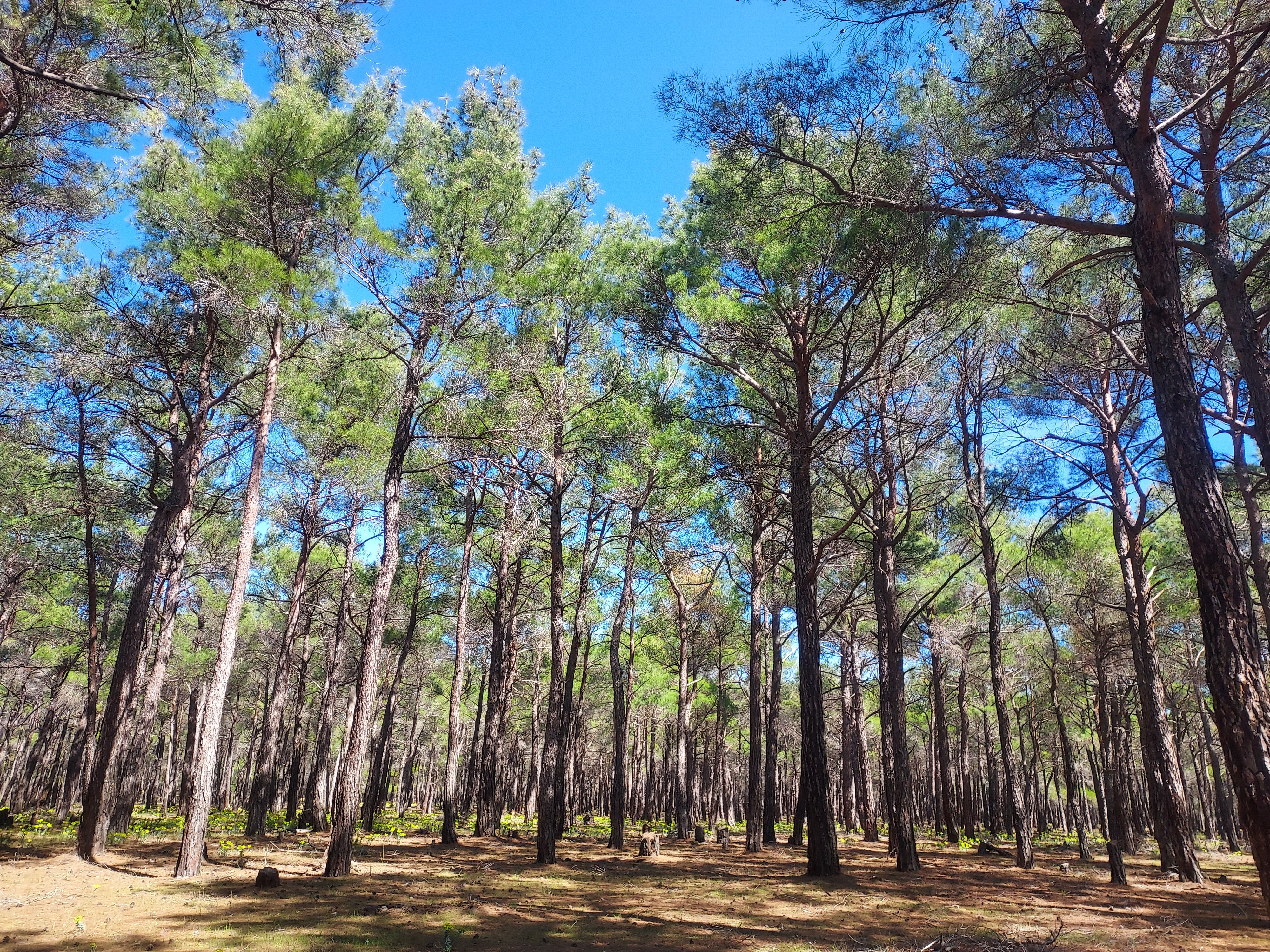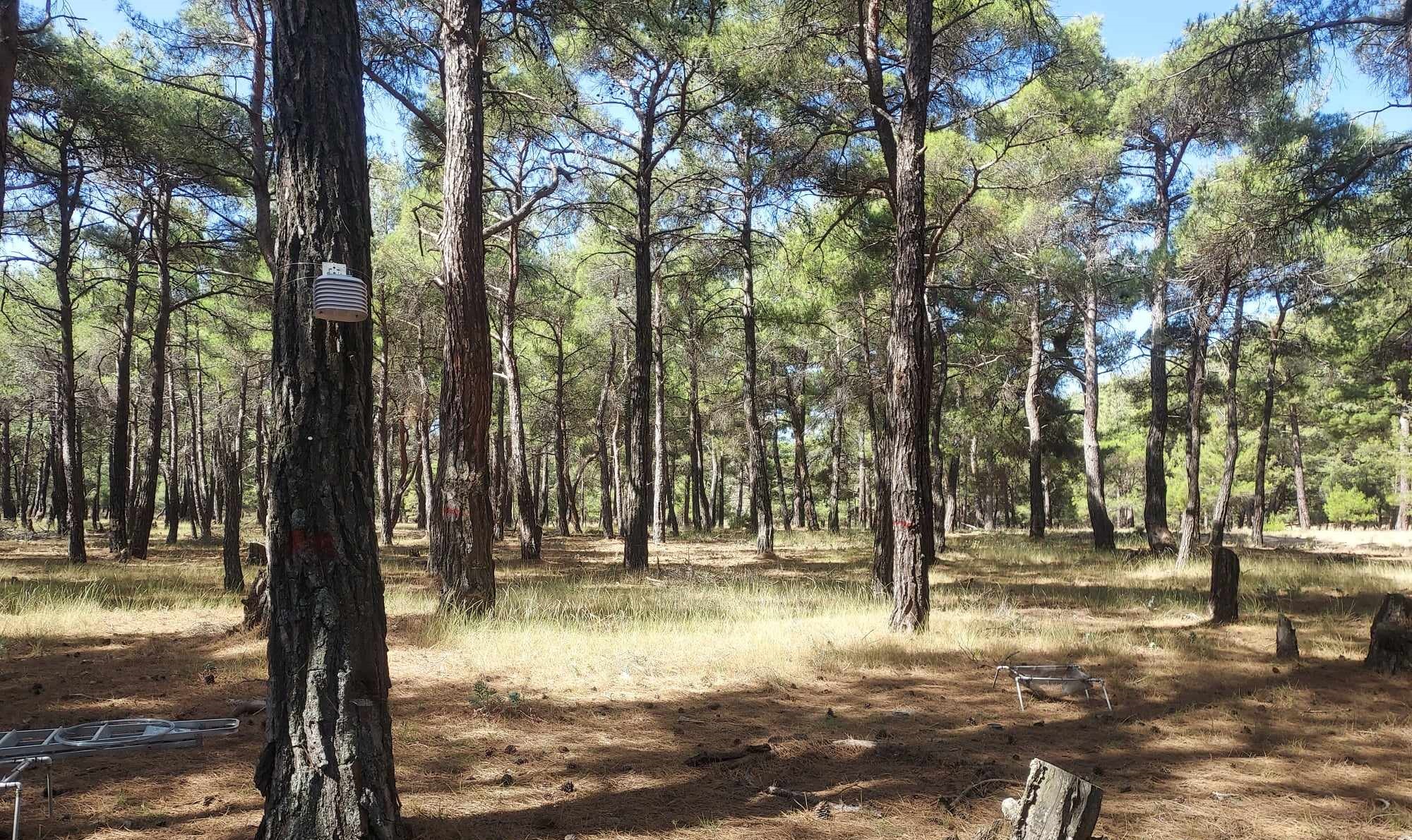Management of Mediterranean Pine forest for Optimizing carbon and water balance under climate change.
To optimize the management of Mediterranean pine forests by enhancing carbon and water balance, thereby addressing climate challenges through an integrative approach that combines tree ecophysiology, forest management, biodiversity conservation, and ecosystem modelling.
Mediterranean pine
forests play a crucial role in maintaining the ecological
balance and resilience of their ecosystems. Under the PineOptim
project, our mission is to pioneer innovative strategies for
managing these forests to maximize their carbon sequestration
and water-use efficiency. By integrating state-of-the-art
ecophysiological research, robust forest management practices,
and advanced ecosystem modeling, we aim to enhance the adaptive
capacity of these forests in the face of escalating climate
challenges. Our approach not only supports biodiversity but also
ensures the sustainability of these invaluable ecological
resources for future generations.
Key Focus Areas:
- Ecophysiological Research: Understanding the
adaptive mechanisms of pine species to optimize forest health
and productivity.
- Forest Management Practices: Developing and
implementing management techniques that balance ecological
sustainability with resource utilization.
- Biodiversity Conservation: Promoting
biodiversity to enhance ecosystem resilience and functionality.
- Ecosystem Modeling: Utilizing dynamic models
to predict and manage the impacts of climate change on forest
carbon and water cycles.
By addressing these critical components, PineOptim endeavors to
protect and sustain Mediterranean pine forests, ensuring their
critical ecosystem services endure amid the shifting climate.

The PineOptim
project is dedicated to fostering a harmonious balance between
forest ecosystems and the changing climate. Our integrated
approach combines cutting-edge research with practical forest
management strategies to ensure that Mediterranean pine forests
not only survive but thrive under new environmental conditions.
Our objectives focus on:
- Climate Resilience: Enhancing the capacity of
pine forests to withstand and adapt to the stresses imposed by
climate change. This includes improving their water-use
efficiency and carbon sequestration capabilities.
- Sustainable Management: Applying
science-based management practices that support long-term
ecological health and productivity of forests.
- Stakeholder Engagement: Collaborating with
local communities, policymakers, and stakeholders to implement
sustainable forest management practices that are both effective
and socially inclusive.
- Data-Driven Decision Making: Leveraging
comprehensive data collection and ecosystem modeling to inform
management practices and predict future forest dynamics.
Through this multifaceted strategy, PineOptim facilitates a
balanced coexistence between human needs and environmental
conservation, ensuring the preservation and enhancement of these
vital ecosystems for future generations.

As part of the
PineOptim project, we are planning a series of future
educational workshops aimed at engaging diverse stakeholders and
disseminating vital knowledge on Mediterranean pine forest
management. These workshops will be pivotal in:
- Sharing Research Findings:
Presenting upcoming results from our ecophysiological studies,
ecosystem modelling, and forest management research.
- Demonstrating Best Practices:
Showcasing effective management techniques that enhance carbon
sequestration and water use efficiency.
- Engaging Stakeholders: Creating
platforms for interaction and collaboration among scientists,
forest managers, policymakers, and local communities.
- Enhancing Skills and Knowledge:
Offering hands-on training and knowledge transfer to foster a
deeper understanding and implementation of sustainable forest
management practices.
- Promoting Collaboration:
Facilitating discussions and partnerships to drive collective
action in addressing climate change challenges.
Planned Workshop Topics Include:
- Introduction to Forest Ecophysiology: Gaining
insights into tree physiology and its practical implications for
forest management.
- Climate-Smart Forestry Practices: Strategies
for managing and optimizing forests under changing climatic
conditions.
- Ecosystem Modelling and Data Analysis:
Techniques for simulating forest dynamics and interpreting
environmental data.
- Community Engagement in Forest Management:
Best practices for involving local communities and stakeholders
in sustainable forest efforts.
- Innovations in Forest Conservation: Exploring
the latest advancements in biodiversity conservation and
ecosystem sustainability.
Stay tuned for announcements on dates and detailed agendas for
our upcoming workshops. These events will provide valuable
opportunities for learning, collaboration, and advancing the
shared goal of optimizing Mediterranean pine forests for carbon
and water balance amid climate change challenges.
By participating in these future workshops, stakeholders will be
better equipped with the knowledge and skills necessary to
contribute to the sustainable management and conservation of
these vital ecosystems.

 title="Lesvos pine forest">
title="Lesvos pine forest">
Understanding the physiological responses of Mediterranean pines to environmental stressors to enhance forest health and resilience.
 title="Xanthi sample plot - gradual
establishment of broadleaves">
title="Xanthi sample plot - gradual
establishment of broadleaves">
Developing and implementing sustainable management techniques tailored to optimize carbon and water balance in pine forests.

Enhancing the adaptive capacity of pine forests to withstand the impacts of climate change.

Promoting species diversity within pine forests to strengthen ecosystem resilience and functionality.

Utilizing advanced models to predict forest dynamics and guide effective management decisions.
 title="Lesvos sample plot - temperature/humidity
sensor">
title="Lesvos sample plot - temperature/humidity
sensor">
Implementing robust data collection and monitoring systems to track forest health and inform management practices.

Collaborating with policymakers, local communities, and other stakeholders to support sustainable forest management policies and practices.

Disseminating knowledge through workshops, publications, and community engagement activities to foster broader understanding and participation in sustainable forest management.
Scion and
ForestSAT look forward to welcoming you to Rotorua,
Aotearoa / New Zealand on 9th - 13th September for the
Association for Forest Spatial Analysis Technologies
Conference.
This will be a conference you don't want to miss! You
will experience the manaakitanga (hospitality) of the
people of Aotearoa and the unique geothermal landscape
and scenery Rotorua is famous for. Equally important as
the location will be the opportunity to attend
stimulating presentations demonstrating new tools and
technologies that drive the science forward.
The 18th
Panhellenic Conference of the Hellenic Botanical Society
(H.B.S.) will take place from 2 to 5 October 2024, in
Thessaloniki at the Centre for the Dissemination of
Research Results (KEDEA) of the Aristotle University of
Thessaloniki.
The central theme of the conference addresses the urgent
need to apply knowledge and research results on a global
scale, particularly focusing on the restoration of plant
diversity in a rapidly changing world. Biodiversity
faces severe and widespread pressures. One of the most
critical pressures on plant diversity concerns climate
change, the impact of which has been documented to
increase rapidly. The recent adoption of the European
Nature Restoration Law constitutes a milestone for the
conservation and management of plant diversity in
Europe. However, its effective implementation requires
the active contribution of all fields of Botany.
Along with research results related to the central theme
of the conference, the 18th Panhellenic Conference of
the H.B.S. warmly welcomes presentations covering a
broad spectrum of topics within the field of Botany,
both basic and applied.
The 10th
Annual Meeting will take place in Rome, Italy from
October 3-7. The opening reception will be held on the
3rd, parallel sessions and plenary events will be held
on the 4th, 5th and 6th, and optional workshops on the
7th. As FLARE celebrates its 10th Anniversary, we will
assess the past while looking to the future of forests
and livelihoods, as we invite reflections on the theme
of the event, “Imagination and Innovation.”
Other sub-themes include forest landscape restoration:
challenges and opportunities,
social justice in the forest: Rights, power, and
collaboration, and data and methods for understanding
forests and human well-being.
The
Government of Azerbaijan will host the 29th Conference
of the Parties of the UNFCCC (COP 29), with a view to
building on previous successes and paving the way for
future ambition to effectively tackle the global
challenge of climate change.
The meeting comprises the twenty-nineth session of the
Conference of the Parties (COP 29), the nineteenth
session of the Conference of the Parties serving as the
meeting of the Parties to the Kyoto Protocol (CMP 19),
and the sixth session of the Conference of the Parties
serving as the meeting of the Parties to the Paris
Agreement (CMA 6).
Conference dates: Monday, 11 November to Friday, 22
November 2024. Location: Baku Stadium, Baku, Azerbaijan
This year,
ESP hosts its 5th European conference under the theme
Ecosystem Services: One Planet, One Health. The theme
refers to the question of how the ecosystem services
concept can address the challenges involved in
delivering the global vision of One Health. It
highlights the interdependence of human health, animal
and plant health, ecosystem health, and the health of
the global environment.
The theme aligns with international commitments under
the Global Biodiversity Framework and is at the heart of
the sustainable development goals. These goals can only
be achieved in a healthy and fair economic system that
takes the full value of nature`s contributions to human
wellbeing into account.
Ecosystem services science can greatly contribute to
addressing various sustainable development and global
health challenges, and presents a great potential for
scientific partnerships across domains and for driving
transformative change. ESP is the leading global
community in the field of ecosystem services. ESP
Conferences serve a vital function for this community,
by providing space for knowledge exchange, networking,
and innovation. At the 5th ESP Europe conference, we aim
to put a special focus on two thematic streams: a)
Ecosystem services and health, and b) Ecosystem services
and conditions for transformative change. The streams
are inspired by the overarching conference theme and
will feed into the conference output and takeaways in
different ways – with a unified purpose of scaling up
the positive impacts of ecosystem services research. Of
course, as always, there will also be ample room for
session proposals that do not fit neatly in the layout
of streams and conditions but do address relevant topics
for the ESP community.
The conference will take place on 18-22 November 2024 in
Wageningen, the Netherlands. The 5th ESP Europe
conference will be an in-person conference to provide an
enriching experience that allows attendees to fully
immerse themselves in the conference, interact with
speakers and engage with other participants in
real-time. However, we will explore options to
livestream the plenary sessions and possibly other
virtual program elements.